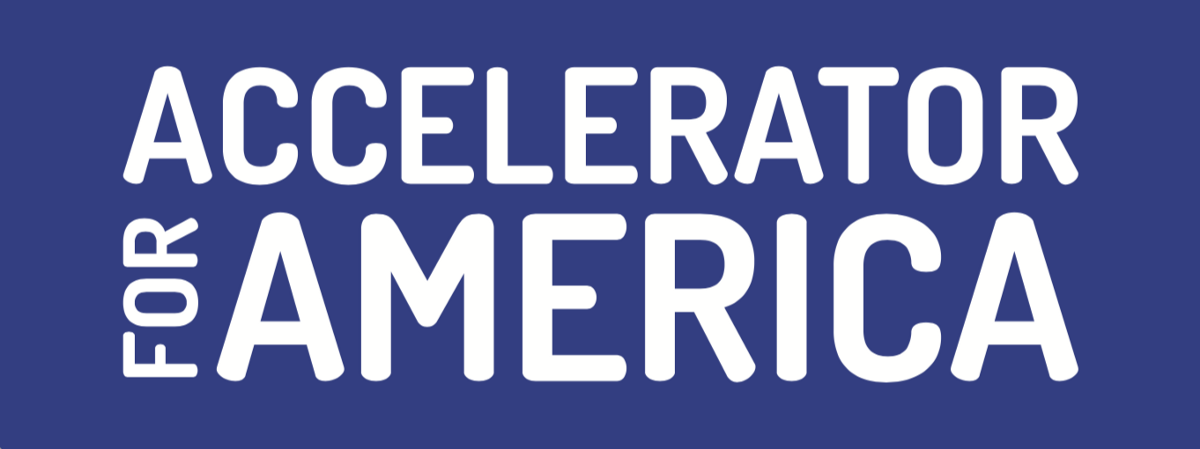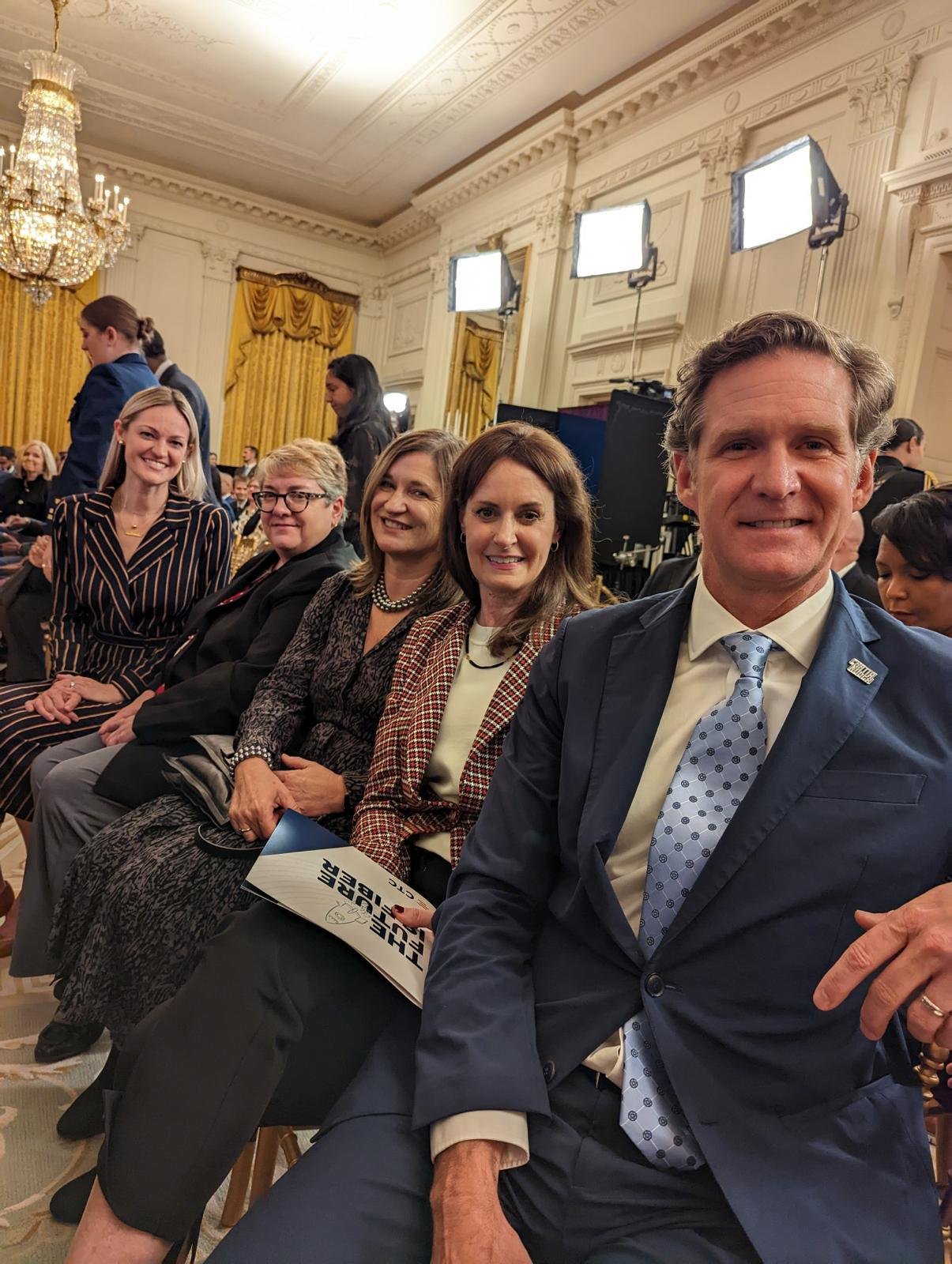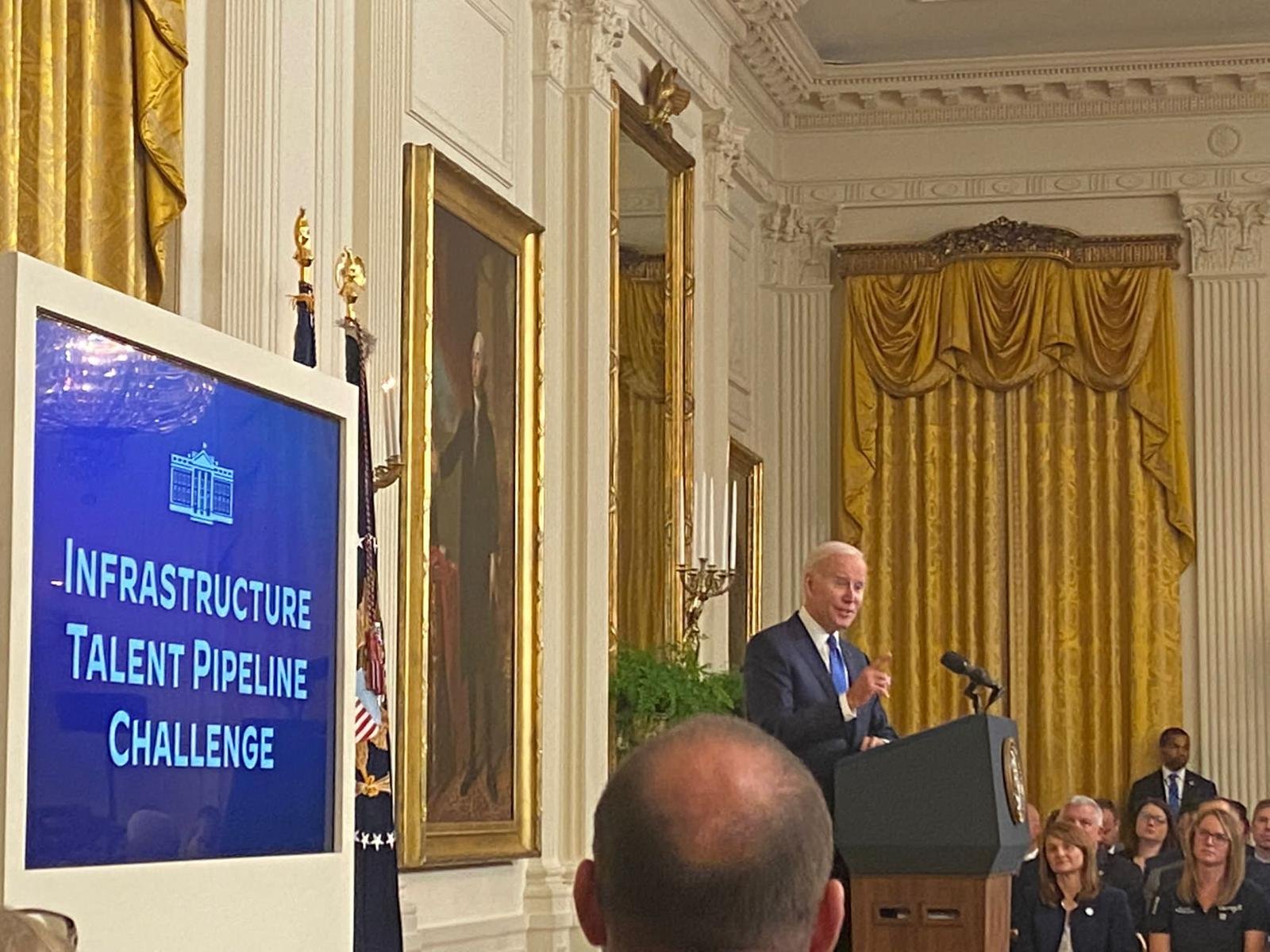What we do
We work with communities to solve workforce challenges and create pathways for good jobs—those that provide family sustaining wages, benefits, and opportunities for economic mobility. America's current workforce development system has failed to progress with the evolving nature of work. Too many Americans are under-skilled and increasingly likely to be chronically un- or under-employed. At the same time, nearly half of graduates of four-year programs are overqualified for their jobs. In short, we have a supply-demand mismatch, leaving fewer people with family-supporting careers and employers with too few qualified workers. With the passage of historic federal legislation for infrastructure, climate, and technology, communities must develop modern workforce training programs to ensure their residents can benefit from the new world of work.
AFA's Mary Ellen Wiederwohl (center) and Ross van Dongen (left) along with our close friend and workforce partner Jim Brewer of NABTU (right) were proud to participate in the Biden-Harris Administration's 2022 Infrastructure Talent Pipeline Challenge.
North America’s Building Trades Unions
Accelerator for America and North America’s Building Trades Unions (NABTU) are partnering to create new and expanded pre-apprenticeship programs in cities across the country. In 2022, AFA and NABTU worked together to recruit Mayors and their cities, pairing them with local trades councils and their training partners. As a result of this effort, AFA city leaders committed millions of new dollars to apprenticeship readiness training programs, including Albuquerque, Chattanooga, Lansing, Salt Lake County, San Antonio, and Scranton with several more cities making plans to join the effort. The initiative was recognized in November at the White House’s Talent Pipeline Challenge.
GOLD STANDARD PLAYBOOK FOR WORKFORCE DEVELOPMENT
As $1.2 trillion of federal infrastructure dollars begin to flow from the Bipartisan Infrastructure Law, local government "project owners" face a lack of trained workers, impacting their ability to start and complete projects on time. At the same time, these local leaders and the communities they represent continue to grapple with the ongoing hollowing of the middle class.
Our “Gold Standard” Playbook presents solutions to this challenge, and helps localities meet new requirements to qualify for federal infrastructure funds -- for example "delivering 40 percent of the overall benefits of relevant federal investments to disadvantaged communities.”
The Playbook was authored by experts from the Accelerator and WSP with the support of The James Irvine Foundation and input from high level executives with HNTB, the Inglewood Basketball and Entertainment Center (new NBA arena), the Los Angeles County Federation of Labor AFL-CIO, the Los Angeles Economic Development Corporation, the Los Angeles Metropolitan Transportation Authority (Metro), the Southern California Regional Rail Authority (Metrolink), the United Brotherhood of Carpenters and Women In Non Traditional Employment Roles (WINTER).
CALIFORNIA TRANSPORTATION INFRASTRUCTURE LANDSCAPE REPORT
This Landscape Report is meant to guide investments being made by philanthropic organizations, project owners, contractors, and unions interested in infrastructure and workforce development efforts across California. Through a combination of expert interviews with labor unions, project owners, labor cost estimators, and construction contractors, along with research and analysis of publicly available documentation, this report provides a view of the transportation infrastructure landscape in the state.
A NEW PATH FORWARD: Place-Based Solutions for a Stronger Workforce Ecosystyem
America’s current system of preparation and training for the job market has failed to progress with the evolving nature of work. Large segments of the population are low-skilled and increasingly likely to be chronically unemployed. At the same time, nearly half of graduates of 4-year programs are overqualified for their jobs. In short, we have both a shortage of workers and a shortage of jobs.
For too long, workforce development has been driven by supply—training institutions that have driven how workers are prepared for their jobs, leading to inefficiencies and mismatches between the skills that workers have and those that businesses need. Now, it is time for a demand-driven approach driven by local leaders. The Accelerator takes a data-driven approach to understand and solve existing workforce disparities.
KANSAS CITY WORKFORCE PROJECT
The Ewing Marion Kauffman Foundation enlisted Accelerator for America to support efforts to enhance the regional workforce development ecosystem and connect employers and job seekers in the greater Kansas City region. Accelerator conducted interviews and focus groups directly with local stakeholders and produced a data tool developed in partnership with mySidewalk, a data analytics company. This project will help identify where gaps and opportunities exist in the local workforce system, with the goal of prompting regional collaboration among public, private, and philanthropic organizations to reskill, upskill, and increase talent in manufacturing, professional and technical services, healthcare, and transportation.








